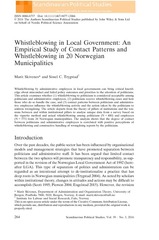Whistleblowing in local government: an empirical study of contact patterns and whistleblowing in 20 Norwegian municipalities
Peer reviewed, Journal article
Published version

Åpne
Permanent lenke
https://hdl.handle.net/1956/15355Utgivelsesdato
2016-09Metadata
Vis full innførselSamlinger
- Department of Government [457]
Originalversjon
https://doi.org/10.1111/1467-9477.12066Sammendrag
Whistleblowing by administrative employees in local governments can bring critical knowledge about misconduct and failed policy outcomes and priorities to the attention of politicians. This article examines whether (1) whistleblowing to politicians is considered acceptable among politicians and administrative employees, (2) politicians receive whistleblowing cases and how those who do so handle the case, and (3) contact patterns between politicians and administrative employees influence the whistleblowing activity and the action taken by the politicians to address wrongdoing. The article departs from the theory of pillars of institutions and the tensions between and within institutional pillars to analyse unique data from a survey based on the vignette method and actual whistleblowing among politicians (N = 400) and employees (N = 373) from 20 Norwegian municipalities. The analysis shows that the degree of contact between politicians and administrative employees is correlated with positive perceptions of whistleblowing and constructive handling of wrongdoing reports by the politicians.
